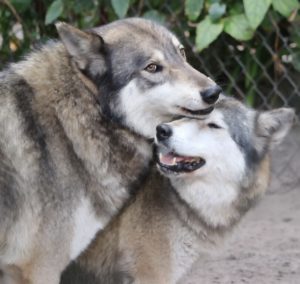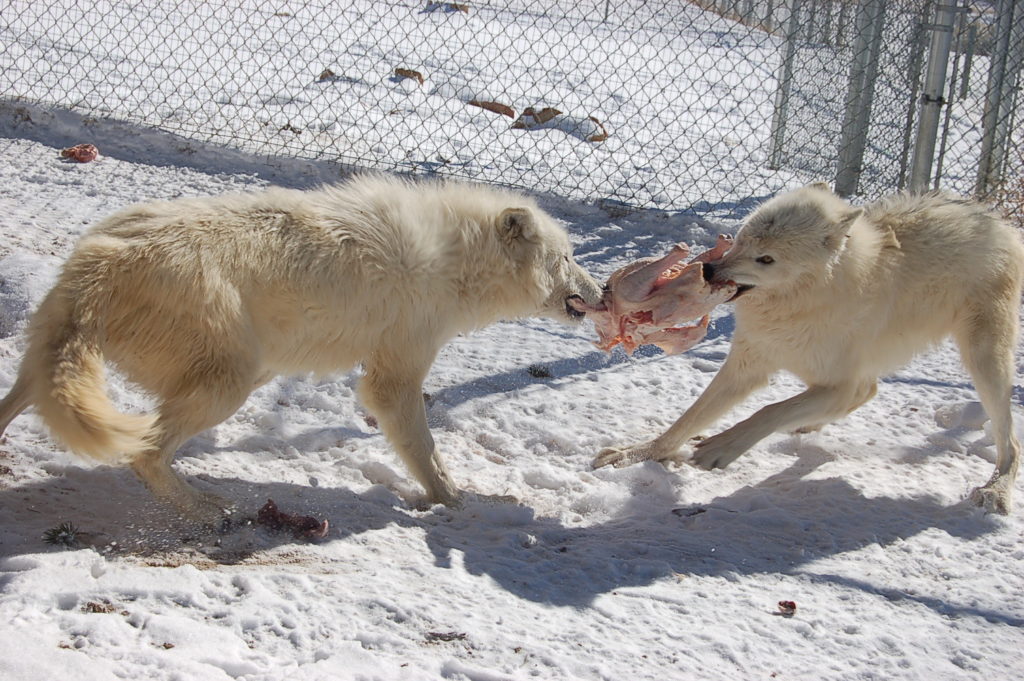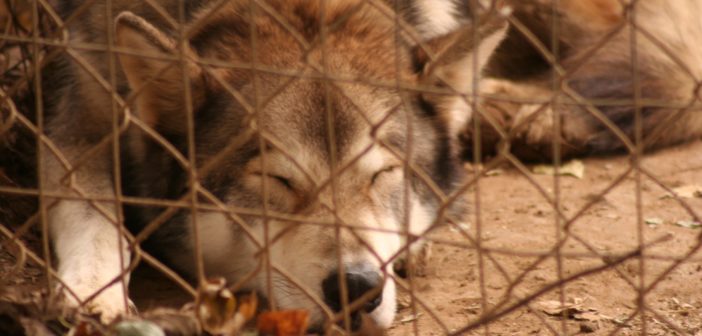
Treasure and Jewel are two of Shy Wolf Sanctuary’s 70 resident animals. Image credit Shy Wolf Sanctuary.
There is no way to accurately estimate how many captive wolves and wolfdogs live in the United States today. People commonly acquire these animals out of a fascination with wolves or desire to connect with nature. Each state regulates exotic animals, and many require permits or even have complete bans on ownership.
Wolfdogs are mixes of captive-bred wolves with domesticated Alaskan Malamutes, Siberian Huskies, or German Shepherds. Most wolfdogs are several generations removed from their pure wolf ancestors. These breeds are chosen due to a certain desired look; however, the dog breeds on their own have high drives and can be difficult to manage in an average home. Combining them with the intelligence and determination of wolf genes can result in a very challenging animal, especially for unprepared owners.
Every single day Shy Wolf Sanctuary gets calls, emails, and social media outreach asking if we have any wolfdog puppies for adoption. Unfortunately, we get a similar number of pleas for help from people surrendering captive-bred exotic pets.
In the United States, we don’t have enough homes for our domesticated dogs and cats. Roughly two million domestic animals surrendered each year are euthanized.
The consequences of abandonment are even graver for captive-bred exotic animals. Domestic animal shelters are unprepared to house or screen potential homes. Animals kept as pets are un-releasable, so rehabilitators can not help. Zoos strictly regulate where their animals come from and where they go. Sanctuaries like Shy Wolf are the only option for most of these animals.

Wolfdogs are not the same to care for as dogs, and many end up surrendered by unprepared owners. Image credit Wild Spirit Wolf Sanctuary, CC BY-SA 2.0.
Shy Wolf does not buy, sell, or breed, just as any sanctuary should not. We rescue and re-home wolfdogs and other exotic pets. Homes are carefully screened prior to adoption and we match up the right animal with the right home to ensure greater success. Any animal adopted through our sanctuary has a 100% commitment from us for the life of the animal. Whether it’s training advice, veterinary expenses, or life changes that require the adopter to surrender the animal, Shy Wolf will always be there as a safety net for the owner and the animal we rescued.
Shy Wolf has seen the worst and best of humanity. The worst is that many animals have come to us totally neglected. They have been emaciated, as much as 40 pounds underweight, collars grown into the skin on their necks, toenails so long they are curled into the pads of their feet, and teeth in such poor condition that they had to have nine teeth pulled and were lucky to survive an infection that had traveled up through the sinus cavities.
The best of humanity is in the volunteers who step up to go on rescues, knowing they will see animals in horrendous conditions that will likely cause nightmares. These amazing people do it for the sake of the animals they are saving, risking injury and committing to the long hard road ahead to earn that animal’s trust through the healing process.
Adopting through a sanctuary or rescue does another important thing. It opens a spot for that rescue to pull an animal out of a shelter situation. Animals behave differently inside and outside of a shelter environment. Animals in rescues or sanctuaries have had the opportunity to be evaluated for containment needs and behavioral issues that might not show up in a shelter. A dog in a kennel can’t demonstrate separation anxiety as readily as they could in a foster situation, where furniture and other objects are readily available to be chewed and destroyed. Rescues and sanctuaries are able to evaluate animals for adoptability and the type of home or training they will be need for successful placement.
If you are considering a new family member, we recommend thoroughly researching the breed or species. While a wolf may only live six to eight years in the wild, a wolfdog may live over 15 years in captivity and some exotic animals can live 40 years or more. Volunteer at a sanctuary or foster for a rescue before committing. You can avoid surrendering an animal when you find one that fits your personality and lifestyle. We work hard to make perfect matches and ensure their ongoing success by standing behind every animal we rehome.
Featured image: a wolfdog at a sanctuary. Image credit kookykrys, CC BY-SA 2.0.





